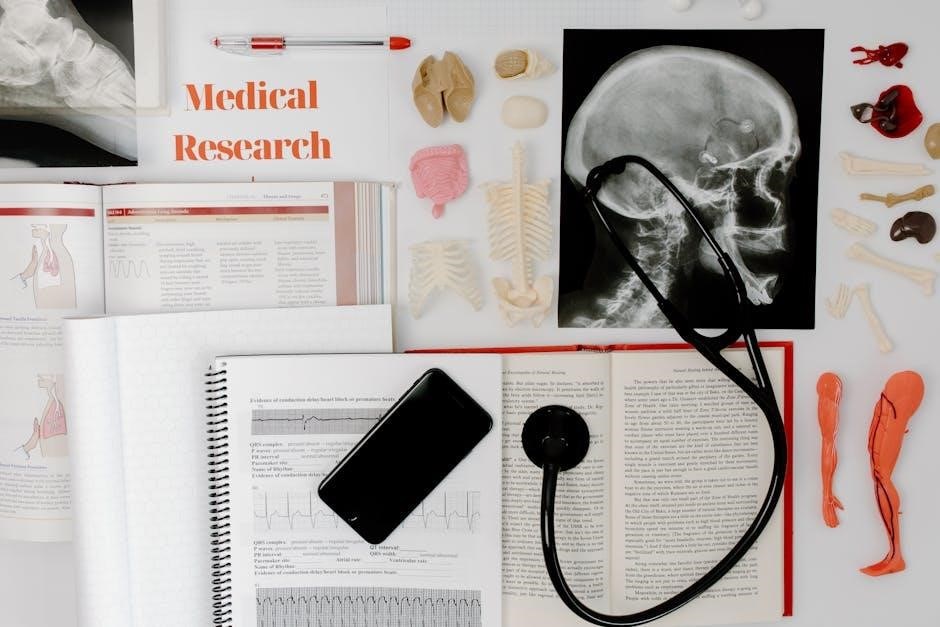
GCSE Mathematics revision is crucial for exam success‚ requiring a structured approach with quality resources like CGP guides‚ past papers‚ and active learning techniques to master key concepts effectively․
1․1 Importance of Revision in GCSE Mathematics
Revision is vital for GCSE Mathematics success‚ as it helps students master key concepts‚ reduce exam stress‚ and build confidence․ Regular review ensures understanding and retention of complex topics‚ enabling better problem-solving skills․ With the pressure of numerical grading (9-1) and the demand for statistical proficiency‚ consistent revision is essential․ Students who revise actively can identify weak areas‚ improve accuracy‚ and develop time management strategies․ Resources like CGP guides and past papers are invaluable‚ offering structured practice and exam-style questions․ Revision fosters a deeper grasp of mathematics‚ preparing students for challenges beyond exams‚ aligning with initiatives to study maths until 18 for future readiness․
1․2 Key Skills to Focus On
Mastering GCSE Mathematics requires focusing on core skills to excel in exams․ Problem-solving is critical‚ as students must apply mathematical concepts to varied scenarios․ Time management is essential to complete papers efficiently․ Accuracy is vital‚ as small errors can lead to lost marks․ Understanding exam command words ensures students interpret questions correctly․ Mental maths skills enhance speed in calculations‚ while formula memorisation aids in tackling higher-tier questions․ Practising multi-step problems helps in breaking down complex tasks․ These skills‚ combined with consistent practice‚ build confidence and competence‚ enabling students to approach exams with clarity and precision․

Understanding the Exam Format
Grasping the GCSE Mathematics exam format is crucial for success․ It includes structured papers‚ varied question types‚ and allocated timings‚ requiring strategic approaches to maximise performance effectively․
2․1 Structure of the Exam Papers
GCSE Mathematics exam papers are divided into two tiers: Foundation and Higher․ Each tier consists of three papers‚ covering Number‚ Algebra‚ Geometry‚ and Statistics․ Foundation focuses on core concepts‚ while Higher includes advanced topics․ Papers vary in length‚ with questions ranging from multiple-choice to extended problem-solving․ Both tiers assess fluency‚ reasoning‚ and problem-solving skills․ Understanding the structure helps candidates allocate study time effectively and approach each section with confidence‚ ensuring they are well-prepared for the exam format and content requirements․
2․2 Question Types and Weightage
GCSE Mathematics exams feature a mix of question types‚ including multiple-choice‚ short-answer‚ and extended problem-solving questions; Multiple-choice questions test quick recall‚ while short-answer questions assess calculation skills․ Extended questions require detailed reasoning and application of multiple concepts․ The weightage of questions varies‚ with higher marks allocated to complex problems․ Understanding the distribution of question types helps students prioritize their practice․ Fluency questions are worth around 30-40%‚ problem-solving 40-50%‚ and reasoning 10-20%․ Familiarity with these formats enhances exam performance‚ allowing students to allocate time effectively and tackle questions with confidence‚ ensuring they maximize their scores across all sections․
2․3 Timing and Strategy
Effective time management is crucial for success in GCSE Mathematics exams․ Allocate time based on question weightage‚ spending more on higher-mark questions․ A suggested strategy is to divide the exam into sections‚ allowing 2-3 minutes per mark․ Start with questions you’re confident in to secure easy marks first․ Use a “top-down” or “bottom-up” approach depending on your strength․ Read questions carefully‚ underlining key terms‚ and plan your answers before writing․ Avoid spending too long on a single question; move on and return if time permits․ Keep 10-15 minutes for reviewing answers to catch errors․ Prioritize accuracy over speed to maximize your score․

Effective Study Techniques
Effective study techniques include active learning‚ organization‚ and retention strategies․ Use note-taking‚ summarization‚ and self-testing to reinforce understanding and retain key concepts effectively․
3․1 Active Recall and Spaced Repetition
Active recall involves actively testing your memory by reconstructing information without looking at notes․ This strengthens memory and understanding․ Spaced repetition involves reviewing material at increasing intervals‚ enhancing long-term retention․ Both techniques are highly effective for math revision‚ as they help build confidence and fluency in problem-solving; Use flashcards to practice formulas and concepts regularly․ Schedule review sessions to revisit topics systematically․ These methods ensure that key mathematical ideas are deeply ingrained‚ making them easier to recall during exams․ Consistency is key to maximizing their benefits and achieving mastery of GCSE mathematics content․
3․2 Using Flashcards for Key Formulas
Flashcards are an excellent tool for memorizing key mathematical formulas and concepts․ Write the formula on one side and its explanation or derivation on the other․ Regularly reviewing these cards helps reinforce memory and ensures quick recall during exams․ Organize flashcards by topic‚ such as algebra or geometry‚ to focus on specific areas․ Use different colors or symbols to highlight important parts of the formulas․ Test yourself by covering the explanation and recalling it from memory․ Flashcards are portable and can be used for short‚ frequent revision sessions‚ making them a versatile and effective study aid for GCSE mathematics preparation․
3․3 Mind Mapping for Conceptual Understanding
Mind mapping is a powerful visual tool for building conceptual understanding in GCSE mathematics․ Start by writing a central idea or topic‚ then branch out to related subtopics‚ formulas‚ and examples․ Use colors‚ symbols‚ and images to make the map engaging and memorable․ This technique helps organize information‚ reveals connections between concepts‚ and aids in retaining complex ideas․ Regularly reviewing mind maps strengthens understanding and improves problem-solving skills․ For exams‚ mind maps can serve as a quick reference guide‚ helping you identify key concepts and relationships at a glance․ This method is particularly effective for visual learners and enhances overall revision efficiency․

Essential Resources for Revision
High-quality revision resources are vital for effective GCSE Mathematics preparation․ These include textbooks‚ online platforms‚ past papers‚ and study guides tailored to exam specifications․ Use them strategically․
4․1 Recommended Revision Guides (CGP‚ Collins‚ etc․)
CGP and Collins revision guides are highly recommended for GCSE Mathematics․ CGP guides are known for their clear explanations‚ detailed examples‚ and abundant practice questions‚ covering both Foundation and Higher tiers․ Collins guides offer comprehensive coverage of the curriculum‚ with a focus on key concepts and exam-style questions․ Both are structured to align with the exam syllabus‚ ensuring targeted revision․ They also include tips for improving problem-solving skills and managing exam anxiety․ These guides are ideal for self-study or classroom use‚ providing students with a robust foundation to excel in their GCSE Mathematics exams․ They are widely trusted by teachers and students alike․
4․2 Past Papers and Mark Schemes
Past papers and mark schemes are indispensable tools for GCSE Mathematics revision․ They provide students with real exam questions‚ allowing them to familiarize themselves with the format‚ question types‚ and difficulty levels․ Practicing past papers helps identify strengths and weaknesses‚ while mark schemes offer insights into how examiners assess answers․ Many exam boards‚ such as AQA‚ OCR‚ and Edexcel‚ publish past papers and mark schemes on their websites or through revision guides․ Regular practice with these resources improves time management‚ problem-solving skills‚ and understanding of command words․ Using past papers alongside mark schemes enables students to refine their techniques and achieve higher grades․ Regular practice is key to success․
4;3 Online Platforms and Tools
Online platforms and tools are invaluable for GCSE Mathematics revision‚ offering interactive and accessible resources․ Websites like Khan Academy and MyMaths provide video tutorials‚ practice exercises‚ and progress tracking․ Mathswatch is another popular platform‚ featuring video lessons and worksheets for key topics․ Additionally‚ Exam-Mate and Revision World offer tailored revision materials‚ including quizzes and past paper questions; Many platforms incorporate gamification‚ making learning engaging․ Some tools‚ like Quizlet‚ allow students to create digital flashcards for formula memorization․ These resources complement traditional study methods and cater to different learning styles‚ helping students stay motivated and engaged throughout their revision journey․ They are especially useful for self-directed learning and quick access to study materials․ Regular use enhances understanding and confidence‚ ensuring exam readiness․

Key Topics to Focus On
Focus on core areas like number‚ algebra‚ geometry‚ and statistics․ Mastering these topics ensures a strong foundation and covers a significant portion of the exam content effectively․
5․1 Number and Algebra
Number and algebra are foundational topics in GCSE Mathematics․ Focus on fractions‚ decimals‚ and percentages‚ ensuring fluency in operations like multiplication and division of fractions․ Practice converting between fractions and decimals‚ and master percentage calculations․ Algebraic manipulation is critical‚ including expanding brackets‚ simplifying expressions‚ and solving linear and quadratic equations․ Pay attention to solving word problems by breaking them down into manageable steps․ Key areas include sequences‚ such as arithmetic and geometric progressions‚ and understanding inverse operations․ Regular practice with past papers will help identify common question types and improve problem-solving speed and accuracy․ Strong number and algebra skills underpin success across all maths topics․
5․2 Geometry and Trigonometry
Geometry and trigonometry are crucial for spatial reasoning and problem-solving․ Focus on properties of shapes‚ including triangles‚ quadrilaterals‚ polygons‚ and circles․ Key theorems like Pythagoras‚ triangle properties‚ and circle theorems are essential․ Trigonometry involves understanding sine‚ cosine‚ and tangent in right-angled triangles‚ as well as the sine and cosine laws for non-right triangles․ Practice calculating angles and sides‚ and interpreting trigonometric graphs․ Practical geometry includes constructing shapes and using compass techniques․ Regularly review 3D geometry‚ such as surface area and volume of pyramids‚ prisms‚ and spheres․ Ensure familiarity with coordinate geometry‚ including plotting points and understanding distance formulas․ These skills are vital for tackling both foundation and higher-tier questions effectively․
5․3 Statistics and Probability
Statistics and probability are fundamental for data analysis and real-world problem-solving․ Focus on understanding different types of data‚ such as categorical and numerical‚ and learn to interpret bar charts‚ line graphs‚ and histograms․ Probability concepts‚ including probability scales‚ experimental and theoretical probability‚ and conditional probability‚ are essential․ Practice calculating probabilities for single and combined events‚ using probability trees and Venn diagrams․ For statistics‚ grasp measures of central tendency and spread‚ including mean‚ median‚ mode‚ and range․ Understand correlation‚ including positive‚ negative‚ and no correlation‚ and learn to identify these from scatter graphs․ Regular practice with probability and statistics problems will build confidence and fluency․

Practicing Past Papers
Practicing past papers helps familiarize students with the exam format‚ improving time management and highlighting areas needing review․ It also builds confidence and reduces exam anxiety․
6․1 Benefits of Mock Tests
Mock tests are a powerful revision tool‚ offering numerous benefits․ They simulate exam conditions‚ helping students adapt to time constraints and pressure․ Regularly taking mock tests identifies knowledge gaps‚ allowing targeted revision․ It also enhances problem-solving speed and accuracy․ Mock tests familiarize students with question formats‚ reducing anxiety․ Additionally‚ they build stamina for lengthy exams and improve time management skills․ By analyzing results‚ students can focus on weak areas․ Mock tests also boost confidence‚ as consistent practice strengthens understanding and reduces exam nerves․ Overall‚ mock tests are an essential part of effective revision‚ preparing students mentally and academically for the actual exam․
6․2 Analyzing Weak Areas
Analyzing weak areas is crucial for effective revision․ By identifying where mistakes occur‚ students can focus their efforts on improving understanding․ Reviewing errors from past papers or practice tests helps pinpoint specific topics or question types that need attention․ Creating a detailed study plan targeting these areas ensures progress․ Regular self-assessment and seeking feedback from teachers can further refine weak spots․ Addressing these gaps builds confidence and strengthens overall performance․ Persistent practice and targeted revision are key to mastering challenging topics and achieving success in the GCSE Mathematics exam․ This focused approach ensures no critical areas are overlooked during preparation․
6․3 Time Management Strategies
Effective time management is vital for success in GCSE Mathematics exams․ Allocate time wisely during practice papers to mirror exam conditions‚ ensuring balanced attention to all sections; Prioritize questions based on difficulty and marks‚ tackling high-weight questions first to maximize scores․ Use techniques like SWOT analysis to identify time-consuming areas and improve efficiency․ Regularly review timing strategies to avoid rushing or spending too long on individual questions․ Incorporate short breaks during study sessions to maintain focus and productivity․ Practice these strategies consistently to build confidence and readiness for the actual exam․ Proper time management ensures optimal performance and reduces stress during the test․

Understanding Exam Command Words
Exam command words guide your response‚ ensuring clarity and focus․ They define what’s expected‚ helping you answer accurately and effectively‚ boosting confidence and accuracy in exams․
7․1 Commonly Used Terminology
Understanding command words is crucial for interpreting exam questions․ Common terms include Calculate‚ requiring numerical answers‚ and Prove‚ asking for mathematical justification․ Compare involves analyzing differences‚ while Explain seeks clear descriptions․ Derive means to show step-by-step reasoning‚ and Apply involves using concepts to solve problems․ Analyse requires breaking down information‚ and Justify demands logical reasoning․ Familiarity with these words ensures accurate responses‚ avoiding misunderstandings․ Each term directs the depth and type of answer expected‚ making them essential for effective exam performance and higher scores․ Mastering these commands enhances clarity and precision in responses․
7․2 Interpreting Question Requirements
Interpreting question requirements accurately is vital for answering correctly; Start by reading the question thoroughly‚ identifying key terms and command words․ Break down complex questions into smaller parts‚ ensuring each component is addressed․ Pay attention to specific instructions like “show all steps” or “use a calculator․” Highlight or underline critical information to maintain focus․ Always check if the question has multiple parts‚ such as (a)‚ (b)‚ and (c)․ Misinterpreting requirements can lead to incomplete or incorrect answers․ Use the mark scheme to understand what examiners expect and practice decoding questions to improve speed and accuracy․ This skill boosts confidence and performance in exams․

Managing Revision Stress
Managing revision stress involves creating a balanced schedule‚ taking regular breaks‚ staying organized‚ and prioritizing self-care․ Proper nutrition‚ exercise‚ and sufficient sleep reduce anxiety and maintain focus‚ ensuring better performance and mental well-being during GCSE preparation․
8․1 Creating a Balanced Study Schedule
A balanced study schedule is essential for managing revision stress․ Allocate specific time slots for each subject and topic‚ ensuring equal focus on strengths and weaknesses․ Incorporate regular breaks to avoid burnout‚ using techniques like the Pomodoro method․ Prioritize challenging areas during peak productivity times‚ such as mornings․ Schedule downtime for relaxation and activities that recharge your mind․ A structured yet flexible timetable helps maintain consistency while allowing adjustments for unexpected tasks․ Regularly review and adapt your schedule to ensure it aligns with your progress and well-being‚ promoting a healthy work-life balance during your GCSE preparation․
8․2 Tips for Staying Motivated
Staying motivated during revision requires a positive mindset and clear goals․ Set achievable targets for each study session to track progress; Reward yourself after completing challenging tasks to maintain enthusiasm․ Surround yourself with supportive peers or join study groups for shared encouragement․ Remind yourself of the importance of your goals and visualize success․ Use positive affirmations to stay focused and avoid procrastination․ Mix study methods to keep sessions engaging‚ such as switching between textbooks‚ online resources‚ and practice questions․ Celebrate small victories to build confidence and maintain momentum throughout your revision journey․ Stay committed‚ and remind yourself that consistent effort leads to success․
8․3 Importance of Breaks and Self-Care
Regular breaks and self-care are crucial for maintaining productivity and mental well-being during revision․ Taking short breaks every 45-60 minutes helps prevent burnout and refreshes the mind․ Engage in activities that relax you‚ such as walking‚ reading‚ or listening to music․ Prioritize sleep‚ aiming for 7-9 hours each night‚ to ensure your brain functions at its best․ A balanced diet rich in fruits‚ vegetables‚ and whole grains supports cognitive function․ Exercise regularly to reduce stress and boost energy levels․ Self-care routines‚ such as meditation or journaling‚ can help manage anxiety and maintain a positive mindset throughout your revision period․

Seeking Additional Support
Supplement your revision with tutoring‚ study groups‚ or online forums for guidance and shared learning experiences to address specific challenges and deepen understanding effectively․
9․1 Tutoring and Study Groups
Tutoring and study groups provide personalized support‚ helping students address specific weaknesses in GCSE Mathematics․ Tutors offer one-on-one guidance‚ tailoring sessions to individual needs‚ while study groups foster collaborative learning․ Peers can discuss challenging topics‚ share problem-solving strategies‚ and clarify doubts collectively․ Regular group sessions encourage accountability and consistent revision․ Additionally‚ study groups allow students to teach concepts to one another‚ reinforcing their own understanding․ Both tutoring and group learning create a supportive environment‚ helping students build confidence and fluency in mathematical concepts․ These resources are particularly beneficial for tackling difficult areas like algebra or geometry‚ ensuring a well-rounded preparation for exams․
9․2 Online Forums and Communities
Online forums and communities are invaluable resources for GCSE Mathematics revision‚ offering a space to ask questions and share knowledge․ Platforms like Reddit (e․g․‚ r/GCSE)‚ Stack Exchange‚ and specialized math forums provide 24/7 access to advice from peers and experts․ Students can discuss challenging topics‚ clarify doubts‚ and gain insights from others’ experiences․ These communities often feature shared resources‚ such as study guides‚ video tutorials‚ and practice problems․ Engaging in online forums fosters a sense of connection and motivation‚ helping students stay focused during revision․ Additionally‚ they allow for anonymous participation‚ making it easier for shy or hesitant learners to seek help and collaborate with others․
9․3 Teacher Feedback and Guidance
Teacher feedback and guidance are instrumental in refining your GCSE Mathematics revision strategy․ Regular one-on-one interactions with teachers allow for personalized insights into your strengths and weaknesses․ They can provide tailored advice‚ clarify complex concepts‚ and help you address specific areas of difficulty․ Teachers often have extensive experience in identifying common pitfalls and can offer strategies to overcome them․ Additionally‚ they can review your practice work‚ highlight errors‚ and suggest improvement techniques․ Actively seeking teacher feedback ensures you stay on track and makes your revision more effective‚ ultimately boosting your confidence and performance in the exam․

Final Preparations
Final preparations involve last-minute revision‚ ensuring all materials are organized‚ and mentally preparing for the exam․ Stay calm‚ review key formulas‚ and maintain a positive mindset․
10․1 Last-Minute Revision Tips
Last-minute revision should focus on key areas and formulas․ Prioritize topics you struggle with most‚ using flashcards for quick recall․ Practice mixed-topic questions to simulate exam conditions․ Stay calm‚ ensure all tools like calculators are ready‚ and avoid cramming․ Skim through revision notes or summaries rather than full textbooks․ Focus on understanding rather than memorizing․ Get enough sleep before the exam to maintain clarity․ Avoid screens before bed to improve sleep quality․ Eat a nutritious meal to fuel your brain․ Arrive early at the exam venue to reduce stress․ Stay hydrated and carry spare stationery․ Remind yourself of past successes to boost confidence․
10․2 What to Expect on Exam Day
On exam day‚ arrive early to avoid stress and familiarize yourself with the venue․ Ensure you have all necessary stationery‚ including a calculator‚ pens‚ and a ruler․ Listen carefully to instructions from invigilators and read the exam paper thoroughly․ Allocate time to each question based on marks‚ starting with easier ones to secure early points․ Stay calm and manage your time effectively‚ leaving space for rough work․ Check your answers if time permits‚ but avoid panicking․ Remember to transfer answers to the answer sheet correctly․ Stay hydrated and maintain focus throughout․ The exam will have a mix of question types‚ so stay alert and apply what you’ve learned․